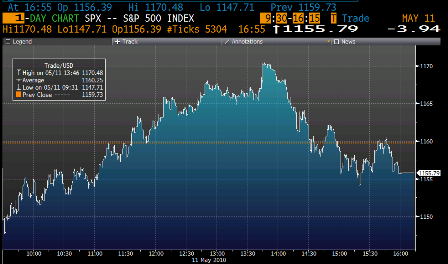govt deficits = ‘non govt’ savings:
The recovery in wealth last year was a result of resurgent financial markets and increased savings, the report said. The Standard & Poor’s 500 Index rose 20 percent in 2009 and the U.S. savings rate averaged 4.2 percent compared with 2.6 percent a year earlier.
>
> (email exchange)
>
> On Fri, Jun 11, 2010 at 3:57 AM, wrote:
>
> What’s interesting about this to me is Slovakia. The Capital, Bratislava,
> is 45 minutes from Vienna by car, and they’re third on the list! Ever
> hear bad things about Slovakia? FLAT TAX of 19 percent for several years
> now and more and more industry growing there. Great restaurants, clubs,
> and more so quality of life has greatly increased. Magna has several
> facilities there as do VW etc etc.
>
Yes, it’s a ‘race to the bottom’ with whoever has the lowest taxes winning business from other EU nations, eventually forcing them to do same.
This is what’s happened to US States, with the States with the lowest tax rates and benefits getting businesses from other States. The problem is that means that States have to spend the least on education and public services to win business, in a race to the bottom.
It’s a fallacy of composition in action. If you stand up at a football game you see better, but soon everyone is standing up so nothing’s gained and no one can sit down (in the case of the football game at least until the front row sits down).
One of the public purposes of the federal govt is to set min standards that prevent races to the bottom
By Alexis Leondis
June 10 (Bloomberg) —The global millionaires’ club expanded by about 14 percent in 2009 with Singapore leading the way, The Boston Consulting Group said.
The number of millionaire households increased to 11.2 million, according to the study released yesterday by the Boston-based firm. Singapore posted a 35 percent gain, followed by Malaysia, Slovakia and China. In 2008, the number of millionaire households fell about 14 percent to 9.8 million.
“Given the severity and magnitude of the crisis, I’m surprised at how fast global wealth has come back,” Bruce Holley, a senior partner in the firm’s New York office and topic expert for wealth management and private banking for the U.S., said in a telephone interview before the report was released.
Global wealth rose by 11.5 percent after falling 10 percent in 2008, as assets under management increased to $111.5 trillion, close to the annual study’s record $111.6 trillion in 2007. North America, defined as the U.S. and Canada, had the greatest gain in assets at $4.6 trillion to $35.1 trillion. The U.S. also had the most millionaire households at 4.72 million, the survey said, while Europe remained the wealthiest region, with $37.1 trillion.
Current numbers may differ from those in last year’s report because of currency fluctuations and newer available data, said Peter Damisch, a BCG partner and a co-author of the report. The study looked at 62 countries representing more than 98 percent of global gross domestic product.
Wealth Recovery
The recovery in wealth last year was a result of resurgent financial markets and increased savings, the report said. The Standard & Poor’s 500 Index rose 20 percent in 2009 and the U.S. savings rate averaged 4.2 percent compared with 2.6 percent a year earlier.
Global wealth dropped in 2008 for the first time since the survey’s 2001 inception as the credit crisis sent stock indexes tumbling and slashed the value of real-estate holdings, hedge- fund and private-equity investments.
Less than 1 percent of households globally were considered millionaires, which is defined as investable assets of more than $1 million, exclusive of real estate and property such as art. Wealth became more concentrated with millionaire households controlling 38 percent of the world’s assets compared with 36 percent a year earlier, the study said.
Singapore also had the highest proportion of millionaire households at 11.4 percent, followed by Hong Kong and Switzerland. The fourth, fifth and sixth spots were in the Middle East — Kuwait, Qatar and the United Arab Emirates. The U.S. was seventh-highest at 4.1 percent.
Growth Rate
The amount of offshore wealth, defined as assets housed in a country other than the investor’s legal residence, increased to $7.4 trillion after declining to $6.8 trillion in 2008 as global regulators pressured countries such as Switzerland to cut down on bank secrecy. Switzerland remained the largest offshore center, with about 27 percent, or $2 trillion, of assets, the report said.
Global wealth will increase at an average annual rate of almost 6 percent from yearend 2009 through 2014, which is higher than the 4.8 percent annual growth rate from yearend 2004 through 2009, the study said. Wealth in the Asia-Pacific region, excluding Japan, is expected to rise almost double the global rate. Last year’s survey said total wealth wouldn’t return to pre-recession levels until 2013.
‘Still Feel Burned’
The report’s authors also looked at the performance of 114 wealth management firms worldwide and found revenue declined by an average of 7.3 percent as assets under management increased an average of 14.3 percent. Reasons for decreased revenue include fewer transactions, tougher price negotiations and a shift to lower-risk asset classes and investments that are liquid and simple, the study said.
Investors feel frustrated and distrustful following the market events beginning in 2008, despite the increase in wealth, Holley said.
“People still feel burned,” said Holley. “I think the numbers in the report suggest a much rosier experience than how people actually feel.”


